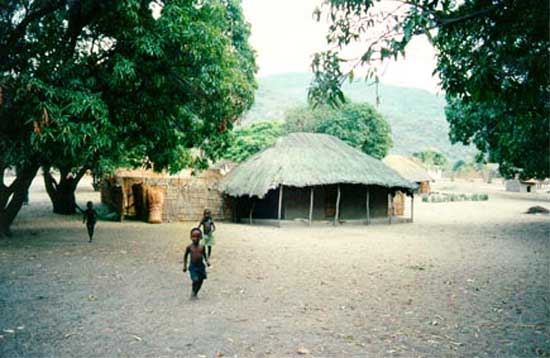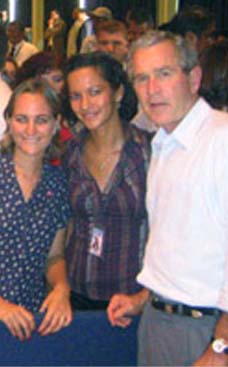November 27, 2005: Headlines: COS - Malawi: Agriculture: Permaculture: Toronto Star: The concept is called "permaculture establishing agriculture that lasts and the Nordins have become advocates in the nine years since they arrived in Malawi as Peace Corps volunteers from the United States
Peace Corps Online:
Directory:
Malawi:
Peace Corps Malawi :
The Peace Corps in Malawi:
November 27, 2005: Headlines: COS - Malawi: Agriculture: Permaculture: Toronto Star: The concept is called "permaculture establishing agriculture that lasts and the Nordins have become advocates in the nine years since they arrived in Malawi as Peace Corps volunteers from the United States
The concept is called "permaculture establishing agriculture that lasts and the Nordins have become advocates in the nine years since they arrived in Malawi as Peace Corps volunteers from the United States

Kristof Nordin is ready for visitors. The dining room table in his modest house west of Lilongwe, Malawi's capital, is covered with dozens of Ziploc bags containing beans, fruit, legumes and other indigenous foodstuffs that he and his wife, Stacia, have collected and dried.
The concept is called "permaculture establishing agriculture that lasts and the Nordins have become advocates in the nine years since they arrived in Malawi as Peace Corps volunteers from the United States
Pushing the `permaculture' solution
MAIZE | There are alternatives
Nov. 27, 2005. 01:00 AM
DAVID WIGHTMAN
SPECIAL TO THE STAR
Kristof Nordin is ready for visitors. The dining room table in his modest house west of Lilongwe, Malawi's capital, is covered with dozens of Ziploc bags containing beans, fruit, legumes and other indigenous foodstuffs that he and his wife, Stacia, have collected and dried.
Once or twice a month, groups from local schools and other institutions tour the house and grounds, which the Nordins, both 37, have developed as a model for how indigenous plants can be used to feed people even at the most drought-ravaged times of the year.
At the front of the house, a bed of much-used herbs grows in the shade of the veranda, protected by small wire cages. At the side of the house, a water garden supports toads, a major pest controller, and edible water plant species. The garden also serves to cool the surrounding area through evaporation.
In plant beds, upside-down beer bottles filled with water serve to irrigate some plants, while a submerged, unglazed flower pot gradually releases water to others.
In the garden, lemongrass, aloes, fruit trees and other food plants have been primed for the rainy season that began this month.
Surrounding the whole operation is a live fence of trees, shrubs and cactus that the Nordins hope will grow up and keep out the neighbourhood goats.
Whatever the conditions here in southern Malawi, even when everything has dried up,the garden flourishes.
"There was drought all around us, supposedly," says Nordin. "But we had to cut back the growth to let sunshine in."
The concept is called "permaculture establishing agriculture that lasts and the Nordins have become advocates in the nine years since they arrived in Malawi as Peace Corps volunteers from the United States.
"Stacia and I weren't even into agriculture when we got here," says Nordin. "We learned everything from Malawians."
The Nordins studied the care and feeding of all those native plants that Mallawians had used for centuries for food, medicine and other applications.
So far, they've compiled a list of 378 food plants.
"There's so much potential for people to grow these foods year-round," says Nordin. But, there's a catch, he cautions.
"These foods are 100-per-cent stigmatized. These are the things that come up and compete with the maize, so they're throwing them away."
This all may seem ironic, given that Malawi is facing its most serious food crisis in years.
But the majority of people here have come to reject staples other than maize. They turn up their noses at anything but corn and don't want to be seen eating local foods for fear they'll be considered too poor to buy "proper" vegetables like carrots and cabbage.
There was a time that people here thrived on sorghum, millet, insects and vegetables that are now seen as weeds.
Nordin says Malawians were not encouraged to think for themselves or use local knowledge, even after independence from Britain in 1964. The late dictator, Kamuzu Banda, told his people that maize was the way to prosperity and mandated a significant proportion of land to be sown with corn.
With an ever-growing reliance on donor food aid and fertilizers, Malawians face increasing food insecurity and what many development workers here term "donor dependence."
"People have been ingrained with a give-me attitude," laments Nordin, who also points to a brighter side to the picture.
About 50 model gardens are now growing, he says, and some schools and workplaces are starting their own small-scale permaculture projects.
And he thinks necessity could cause more Malawians to try something new something that's actually based on ancient ideas.
"It's about taking what the grandparents knew and improving on it," says Nordin. "In these harder years, people are listening more."
David Wightman
When this story was posted in November 2005, this was on the front page of PCOL:





Peace Corps Online The Independent News Forum serving Returned Peace Corps Volunteers
 | PC establishes awards for top Volunteers
Gaddi H. Vasquez has established the Kennedy Service Awards to honor the hard work and service of two current Peace Corps Volunteers, two returned Peace Corps Volunteers, and two Peace Corps staff members. The award to currently serving volunteers will be based on a demonstration of impact, sustainability, creativity, and catalytic effect. Submit your nominations by December 9. |
 | Why blurring the lines puts PCVs in danger
When the National Call to Service legislation was amended to include Peace Corps in December of 2002, this country had not yet invaded Iraq and was not in prolonged military engagement in the Middle East, as it is now. Read the story of how one volunteer spent three years in captivity from 1976 to 1980 as the hostage of a insurrection group in Colombia in Joanne Marie Roll's op-ed on why this legislation may put soldier/PCVs in the same kind of danger. Latest: Read the ongoing dialog on the subject. |
 | Peace Corps at highest Census in 30 years
Congratulations to the Peace Corps for the highest number of volunteers in 30 years with 7,810 volunteers serving in 71 posts across the globe. Of course, the President's proposal to double the Peace Corps to 15,000 volunteers made in his State of the Union Address in 2002 is now a long forgotten dream. With deficits in federal spending stretching far off into the future, any substantive increase in the number of volunteers will have to wait for new approaches to funding and for a new administration. Choose your candidate and start working for him or her now. |
 | 'Celebration of Service' a major success
The Peace Corps Fund's 'Celebration of Service' on September 29 in New York City was a major success raising approximately $100,000 for third goal activities. In the photo are Maureen Orth (Colombia); John Coyne (Ethiopia) Co-founder of the Peace Corps Fund; Caroline Kennedy; Barbara Anne Ferris (Morocco) Co-founder; Former Senator Harris Wofford, member of the Advisory Board. Read the story here. |
 | PC apologizes for the "Kasama incident"
The District Commissioner for the Kasama District in Zambia issued a statement banning Peace Corps activities for grave social misconduct and unruly behavior for an incident that occurred on September 24 involving 13 PCVs. Peace Corps said that some of the information put out about the incident was "inflammatory and false." On October 12, Country Director Davy Morris met with community leaders and apologized for the incident. All PCVs involved have been reprimanded, three are returning home, and a ban in the district has since been lifted. |
 | The Peace Corps Library
Peace Corps Online is proud to announce that the Peace Corps Library is now available online. With over 30,000 index entries in 500 categories, this is the largest collection of Peace Corps related stories in the world. From Acting to Zucchini, you can find hundreds of stories about what RPCVs with your same interests or from your Country of Service are doing today. If you have a web site, support the "Peace Corps Library" and link to it today. |
 | Friends of the Peace Corps 170,000 strong
170,000 is a very special number for the RPCV community - it's the number of Volunteers who have served in the Peace Corps since 1961. It's also a number that is very special to us because March is the first month since our founding in January, 2001 that our readership has exceeded 170,000. And while we know that not everyone who comes to this site is an RPCV, they are all "Friends of the Peace Corps." Thanks everybody for making PCOL your source of news for the Returned Volunteer community. |
Read the stories and leave your comments.

Some postings on Peace Corps Online are provided to the individual members of this group without permission of the copyright owner for the non-profit purposes of criticism, comment, education, scholarship, and research under the "Fair Use" provisions of U.S. Government copyright laws and they may not be distributed further without permission of the copyright owner. Peace Corps Online does not vouch for the accuracy of the content of the postings, which is the sole responsibility of the copyright holder.
Story Source: Toronto Star
This story has been posted in the following forums: : Headlines; COS - Malawi; Agriculture; Permaculture
PCOL24046
39















